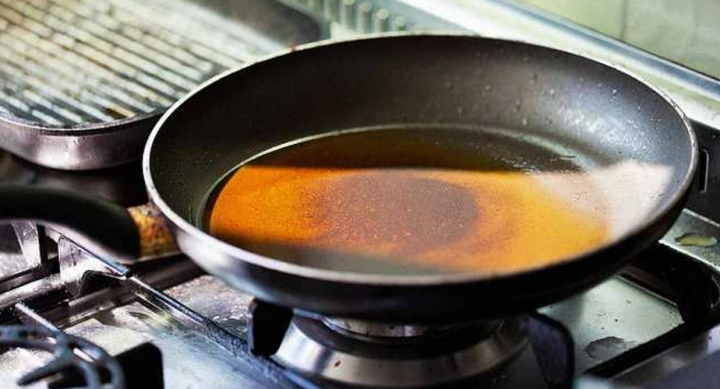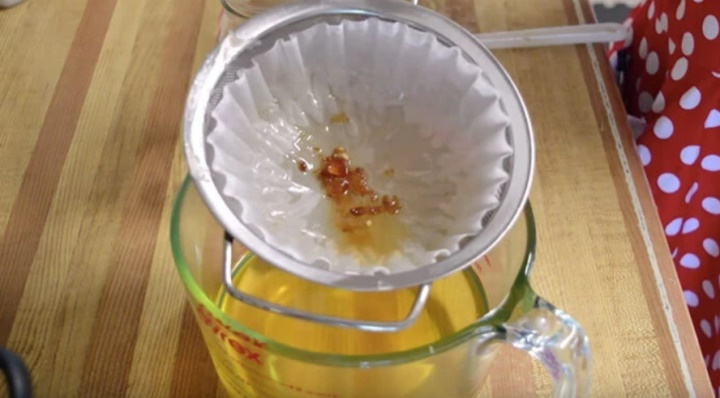Improper handling of excess cooking oil can have a serious impact on the environment, so it’s important to know how to properly handle and safely reuse excess cooking oil if you want to save money.
How to Handle Excess Cooking Oil?
Do Not Pour Down the Drain
Pouring cooking oil down the sink, drain, dishwasher, or toilet can cause blockages in your home’s plumbing system and contribute to widespread clogs in city water pipes, potentially causing serious damage to the environment and the economy.
While grease may be in liquid form when hot, it solidifies and congeals in your pipes as it cools, forming large oil globules and build-up. As the amount of grease increases, it will block the flow of water, causing it to backflow into your kitchen and other areas of your home.

Properly handle and safely reuse excess cooking oil.
Store or Reuse
If the oil is only used once and is not burnt, you can learn some tips to clean used oil and then store the recycled oil in the refrigerator for later use. It is important to remove any leftover food in the oil using a strainer, filter bag, etc. According to experts, you should keep the cooking oil in the refrigerator, preferably in a glass jar. Never store used oil at room temperature as it will spoil quickly. Note that used oil can only be kept for three to four weeks.
The method of handling excess oil is very simple, but remember to avoid the situations mentioned above. All you need to do is throw the cooking oil in the trash, however, follow these steps:
– Allow the oil or grease to cool completely or solidify
– Once the oil has cooled, put it in a sealed container for disposal
– When the container is full, put it in a plastic bag to prevent any oil leakage and finally dispose it in the trash
Even when you dispose of the majority of excess oil, use paper towels to wipe all pots, pans, and dishes that have come into contact with oil before putting them in the sink. Understand that even a small amount of excess grease can be dangerous for your home’s plumbing system as it will accumulate over time.
How to Filter Used Cooking Oil
As long as the oil is used properly and not overheated or burnt, you can perform the following tips to filter and recycle the excess cooking oil.
– Use a paper towel or coffee filter lining a funnel or strainer underneath to catch the oil. Filter the cooking oil through the strainer and paper towel several times to remove all food residues and ensure clean oil for future use. When the oil has cooled, pour it into a glass jar with a lid, and store it in the refrigerator, freezer, or a cool place.

Properly recycle excess cooking oil.
Use cornstarch, cornflour: All you need to do is mix 1 tablespoon of cornflour with 60 ml of water. Add this mixture to 240 ml of cooled or slightly warm oil. Slowly heat the cooking oil on the stove over low heat while stirring constantly with a spoon until the cornstarch mixture gradually solidifies. This process usually takes about 10-12 minutes. The cornstarch mixture will absorb all the residues in the oil. Finally, simply strain the oil through a fine mesh strainer to help keep the oil clean and clear. Let the filtered oil cool and store it in a sealed glass container.
Notes when using excess cooking oil
There is no denying that filtering used cooking oil can help save money for users. However, not all filtered cooking oil can be used. When using, pay attention to the following issues:
– Cooking oil should only be used for up to 3 times, with no more than 2 filterings to avoid deterioration.
– If the cooking oil has become black smoke, it should not be reused or continued to use.
– If the used oil has an unpleasant smell, do not reuse it.
– Strongly flavored cooking oils such as fish oil, seasoned frying oil should not be used for baking, frying potatoes, or frying eggs. It is best to separate each type of oil to avoid mixing flavors.
– After each time of recycling, the stability of the oil will gradually deteriorate, so try to use it up or not add new oil to the recycled oil. This will reduce the number of times the oil is recycled.
– Recycled cooking oil should not be kept for too long and should be used as soon as possible to avoid spoilage.
– When storing the recycled cooking oil container, it should be tightly wrapped, use silver paper to cover the mouth to avoid water and sunlight.
– Avoid recycling different types of cooking oils that have different origins, such as canola oil with sesame oil or soybean oil with brown rice oil…
According to vtc.vn
































